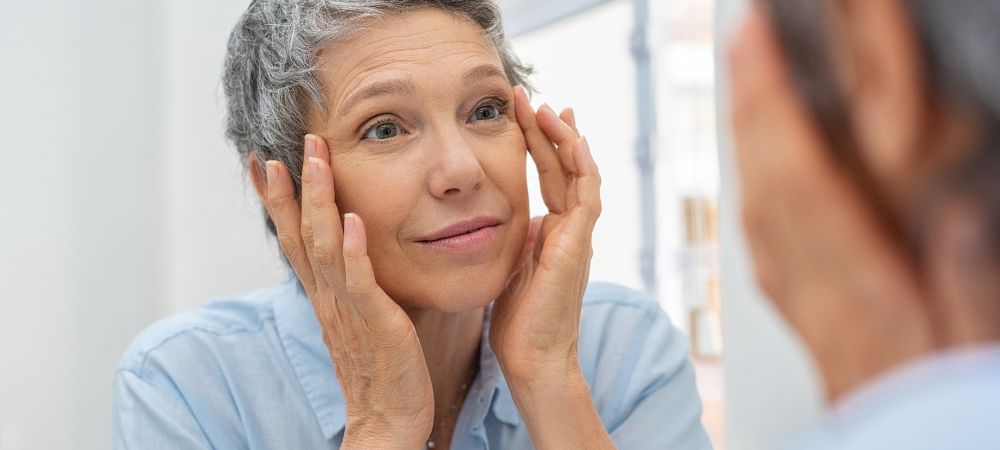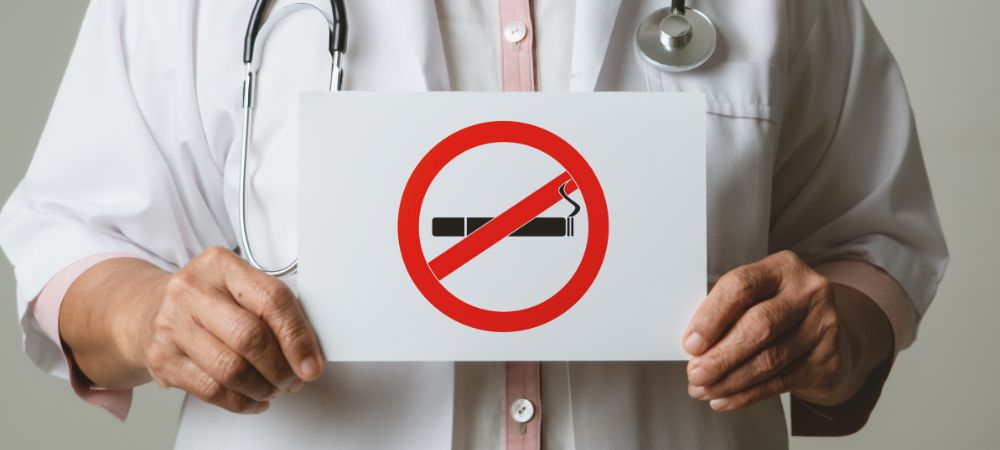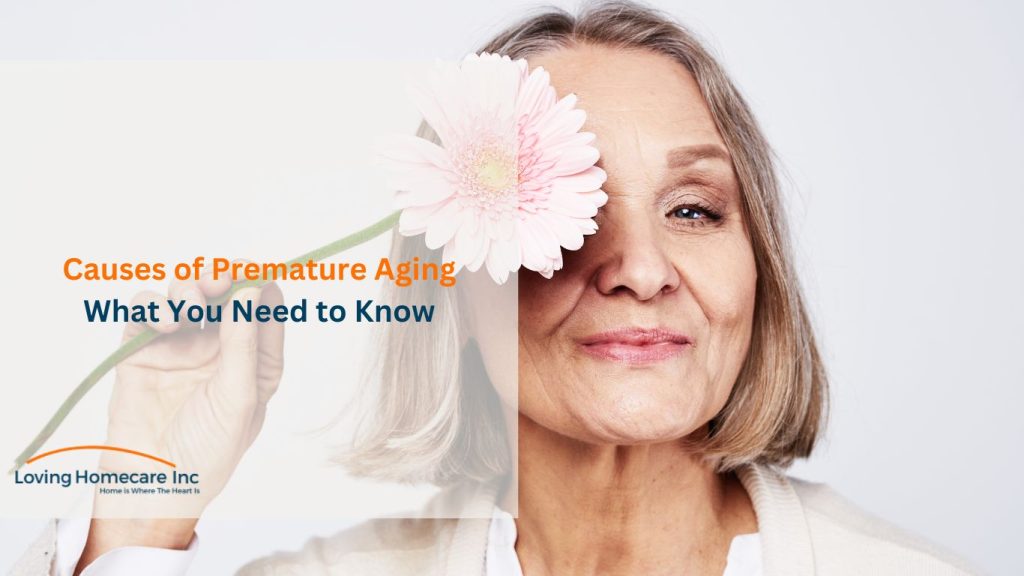Recently updated on January 8th, 2026 at 10:44 am
Premature aging refers to the occurrence of age-related changes and symptoms at an earlier stage than expected. It is the condition when one’s physical appearance seems older than one’s chronological age. Common indicators of premature aging include skin alterations such as wrinkles, age spots, dryness, diminished skin elasticity, hyperpigmentation in the chest area, and drooping.
With the population over 85 expected to triple by 2050, addressing premature aging is increasingly vital. Recent trends highlight that early skin aging affects many adults, and interventions now embrace holistic wellness, digital health tools, and personalized skincare to combat this issue effectively.
In and of itself, aging is not a sickness. Aging, however, is the main risk factor for the onset of several serious chronic illnesses. Moreover, aging seems to be accelerated by a number of disorders, resulting in decreased quality of life and functional decreases.
Let’s know together more about premature aging and some main root causes of premature aging!
What is Premature Aging?

The premature aging syndromes include a range of phenotypic conditions, including mandibulofacial dysplasia (MAD), Hutchinson-Gilford progeria syndrome, and restricted dermopathy. Progeria is commonly referred as premature aging synonym. It includes two very uncommon hereditary disorders, namely Hutchinson-Gilford syndrome and Werner syndrome. Both disorders exhibit skin changes that signify accelerated aging, such as:
- Atrophy refers to the thinning of the skin and the loss of its suppleness.
- Cutaneous fat depletion
- Formation of creases or folds on a surface, typically due to compression or contraction.
- Gray hair
- Hair loss
- Nail dystrophy refers to a condition characterized by abnormal changes or deformities in the nails.
- Abnormal pigmentation
- Ulceration refers to the process of developing an open sore or lesion on the surface of the skin or mucous membranes.
- Progeria is a condition where the changes that normally happen to the body as it ages (such as skin aging) happen faster.
Definition of Premature Aging
“Multiple human organs and tissues exhibit characteristics of accelerated aging in a human disorder known as premature aging syndrome.”
What Causes Premature Aging?
Stress, smoking, lack of sleep, and too much sun exposure damage skin cells and hasten aging, all of which contribute to premature ageing. Impaired skin health and premature aging are consequences of several factors, including a poor diet, heredity, alcohol use, and air pollution. To slow down the aging process, it is important to control certain variables.
How does Premature Aging Differ from Natural Aging?
| Aspect | Normal Aging | Premature Aging |
| Onset | Gradual, typically noticeable after age 30. | Rapid, noticeable at a much younger age. |
| Skin | Fine lines and wrinkles develop over time. | Deep wrinkles and significant loss of elasticity early on. |
| Hair | Gradual graying and thinning. | Rapid graying and significant hair loss early. |
| Bone Density | Gradual decrease with age. | Early onset osteoporosis and frequent fractures. |
| Cognitive Function | Mild decline over decades. | Severe cognitive decline at a young age. |
Signs of Premature Aging
Common signs of premature aging include xeroderma, wrinkles, sagging skin, thinning hair, liver spots, dullness, sunspots, uneven skin tone, achy joints, chest hyperpigmentation, cognitive decline, hyperpigmentation, chronic conditions, deep facial creases, dry and thinning skin, gaunt features, poor lifestyle choices, reduced muscle tone, stress, and visible pores.
- Xeroderma, xerosis or xerosis cutis, or simply dry skin, is a skin condition characterized by excessively dry skin. In most cases, dry skin can safely be treated with moisturizers.
- Hair loss, also known as alopecia or baldness, refers to a loss of hair from part of the head or body. Typically, at least the head is involved. The severity of hair loss can vary from a small area to the entire body. Inflammation or scarring is not usually present.
- Wrinkles form because the elastin and collagen fibers that keep the skin tight and smooth weaken. This causes skin looseness and laxity, as well as wrinkles.
10 Main Root Causes of Premature Aging
Sun Exposure
Ultraviolet light, including UVA and UVB, causes genetic damage that accelerates aging and increases skin cancer risk. Regular use of broad-spectrum sunscreen is now a cornerstone of prevention, offering high ROI by reducing UV-induced damage and premature aging, particularly for older adults with diminished skin repair capacity.
Smoking

Tobacco use may reduce the skin’s natural capacity to heal itself in part because it increases the synthesis of metalloproteinase (MMPs), an enzyme that causes collagen breakdown and skin sagging. An imbalance between production and degradation in dermal connective tissue metabolism is suggested by the breakdown of collagen, elastic fibers, and proteoglycans caused by smoking. The skin ages more quickly when exposed to cigarette smoke, and reactive oxygen species play a role in this.
Poor Diet
Poor diet is one of the major causes of premature aging. Some research suggests that eating a lot of sugar or processed carbs could speed up the aging process. The flip side is that eating a lot of fruits and vegetables might delay the aging process. Vitamin D deficiency causes skin to burn more quickly in the sun, according to a research. Having an adequate vitamin D level in your body may help delay the onset of skin premature aging, since sun exposure is a major external factor in the development of fine lines and pigmentation.
Alcohol Consumption
When you drink alcohol, you risk dehydration of the body and skin. Wrinkles appear more prominently and a lackluster tone might set up on dry skin. Vitamin and mineral loss are an additional side effect of alcohol’s diuretic (water-loss) action. The skin’s collagen levels drop when one drinks alcohol because vitamin levels, particularly vitamin A, are depleted. The end effect can be a loss of skin suppleness and wrinkles. Alcohol may also dry the skin, which can lead to wrinkles. Most people who drink a lot noticeably end up with red, puffy faces.
Lack of Sleep
Wrinkles and age spots are reduced when you sleep because your blood flow improves to the skin, which repairs UV damage, rebuilds collagen, and enhances circulation. This results in a higher probability of flare-ups, increased sensitivity, and inflammation, as the skin’s natural barrier function is compromised. In addition, research has demonstrated that inadequate sleep quality is linked to an increase in the appearance of skin aging, such as dullness, uneven skin tone, and diminished skin elasticity.
Stress

Premature aging can be caused by oxidative stress, which can damage cells, proteins, and DNA. The primary mechanism responsible for the associations between stress and these health outcomes is the acceleration of the biological aging process, which includes an increase in systemic inflammation and telomere shortening. The protective “caps” on the ends of DNA chromosomes, known as telomeres, are doomed to degrade over time. However, scientists have discovered that the process may be accelerated when the body is under stress. The cells are no longer protected when the telomeres are too short.
Pollution
In numerous independent cohorts, premature skin aging has been linked to traffic-related air pollution exposure, including nitrogen dioxide (NO2), smoke, and particulate matter (PM). Human skin is additionally exposed to UV radiation in real life, which is recognized for its ability to induce premature skin aging. A recent epidemiological study has identified a direct correlation between the occurrence of prominent skin aging indicators, particularly pigment blotches and creases, and ambient particulate matter (PM) exposure.
Genetics
Multiple genes related with premature ageing contribute to the genetic, pathological, and physiological differences seen in an organism. These variations are comparable to those shown in ageing organisms and may help explain the genes linked to the ageing process. The aging process is a result of both genetically controlled developmental programs and the long-term exposure of a human (and their genetic makeup) to the environment.
Lack of Skincare Routine
To delay the aging process and keep skin looking young, it is essential to use skincare products in conjunction with a healthy lifestyle.
Modern skincare strategies to prevent premature aging include advanced sunscreens, antioxidant-rich serums with vitamins C and E, and gentle exfoliation designed for mature skin. Innovations such as AI-personalized regimens, collagen-boosting peptides, and pollution-protection formulas are enhancing effectiveness and supporting skin resilience through digital health monitoring.
Dehydration
Elevated blood salt levels throughout middle age were shown to be linked to higher death rates, increased risk of chronic diseases, and accelerated biological aging. The results indicate that inadequate hydration may expedite the process of biological aging and heighten the likelihood of developing chronic illnesses and mortality.
Beyond traditional factors, emerging trends in geroscience are targeting biological aging processes like telomere shortening and oxidative stress through multi-omics and AI-driven biomarker discovery. Digital health innovations, including personalized skincare regimens and remote monitoring for chronic conditions, are revolutionizing how we delay aging and enhance quality of life, blending technology with holistic lifestyle interventions.
Combat Premature Aging Today with Loving!
It is imperative to address the underlying causes of premature aging in order to preserve the youthfulness and vibrancy of one’s appearance. The ageing process can be significantly slowed by comprehending and managing factors such as stress inadequate nutrition, smoking, and solar exposure. Staying hydrated, managing tension, and adhering to a correct hygiene regimen are also essential for maintaining the youthful appearance of your skin. In addition,
Aging in place, supported by expanded home healthcare, technology-enabled monitoring, and integrated wellness programs, helps minimize premature aging factors by promoting independence, social engagement, and access to personalized care. Digital health platforms and holistic approaches are key trends in maintaining skin and overall health for seniors.
For additional expert advice on professional care and healthy aging, please visit Loving Homecare Services. Begin your voyage towards a sprightlier version of yourself today!

